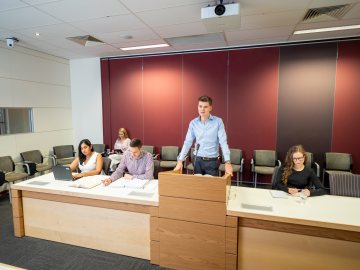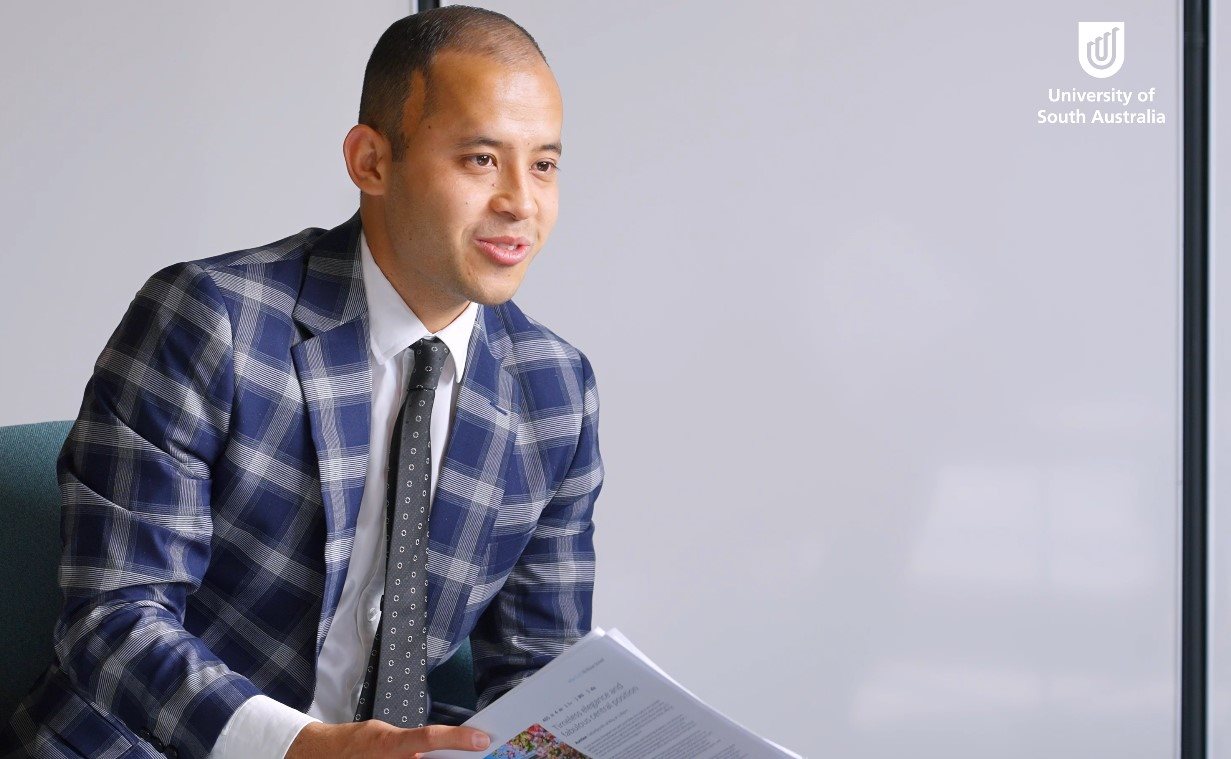Bachelor of Laws (Honours), Bachelor of Business (Human Resource Management)
Degree Level Undergraduate
Year 2025
You're considered an Australian student if you are any of the following:
Degree Level Undergraduate
Year 2025
Entry Scores
2025 Guaranteed Entry
Year 12 (ATAR-based): 90.00
Year 12 (Grades-based): A,A,A
TAFE/RTO: AdvDIP
View Guaranteed Entry Info
2024 Cut-Offs
Year 12 (ATAR-based):
- Internal: 90.00
TAFE/RTO: Dip
View full entry requirements
The admission criteria have been grouped to assist you to easily find the information most relevant to your circumstances. However, you may fit into more than one and the university will consider applicants against each of the relevant criteria.
Certain conditions apply. For more information refer to Appendix 4 of the University's Selection and Entry policy.
Applicants are required to meet one of the following criteria with a competitive result, and demonstrate that they fulfil any prerequisite requirements and essential requirements for admission:
Recent secondary education
Meet any prerequisite requirements with a minimum grade of C- or equivalent
AND
Applicants who have not achieved the Selection Rank required for automatic selection may be selected for any remaining places based on the grades of their year 12 subjects.
OR
Higher education study
OR
Vocational Education and Training (VET)
OR
Work and life experience
The Graduate Diploma in Legal Practice option is not available to international students studying in Australia on a student visa.
1ComparED (QILT) Student Experience Survey 2021-22, Law and Paralegal Studies – Overall Quality of Educational Experience Indicator(Undergraduate). Public universities. 2ComparED (QILT) Graduate Outcomes Survey 2021-23 – Full-time Employment Indicator (Domestic Undergraduate). SA public universities. 3Ranked #9, ComparED (QILT) Graduate Outcomes Survey 2021-23 – Full-time Employment Indicator (Domestic Undergraduate). SA public universities. 32018 Excellence in Research for Australia (ERA). 4Results in Business and Management - 2018 Excellence in Research for Australia (ERA).
 Gain a competitive edge by combining law with human resource management and graduate with two degrees in just 5 years.
Gain a competitive edge by combining law with human resource management and graduate with two degrees in just 5 years.
A double degree expands your knowledge and opens doors to a broad range of career opportunities.
You will graduate with professional honours, an advanced understanding of legal principles of Australian law and the latest legal concepts in human resource management. This legal expertise, combined with the knowledge and skills you’ll gain from your Human Resource Management specialisation, will set you on track for a rewarding career.
In your law studies you can undertake a Community Justice Project, practice advocacy and negotiation, or gain industry experience through participation in our Legal Advice Clinic or a professional placement. You’ll also be involved in mock-trials in our moot court, learning what it’s like to act as an advocate and argue a case before a judge. During the final year of your Law Honours degree, you will also have the opportunity to undertake the Graduate Diploma in Legal Practice (GDLP), a compulsory qualification needed to practise as a barrister or solicitor in South Australia. You can use your GDLP qualification towards your law degree study, and shorten your pathway to practice*.
In your human resource management studies you will develop the skills and knowledge to manage people to achieve positive outcomes. You’ll understand recruitment, staff performance appraisal, training and development, and staff retention. During your studies, you will also develop a solid understanding of management systems.
* The Graduate Diploma in Legal Practice (GDLP) is delivered by arrangement with the College of Law during your final year. Following completion of the GDLP, you can claim 4 course credits towards your law degree, shortening your pathway to practice.
 This degree is made up of 40 courses. You will do 24 courses in law and 12 courses in human resource management.
This degree is made up of 40 courses. You will do 24 courses in law and 12 courses in human resource management.
As a UniSA Law student, you’ll gain valuable skills from day one, including in reasoning, reporting, analysis, negotiation, communication and advocacy. You will also experience what it's like to argue a case and provide legal advice.
Throughout your degree you will study core courses that teach you the fundamental legal concepts that underpin the Australian legal system. Courses such as torts, contracts, criminal law and constitutional law will give you a good understanding of basic legal principles.
Our Law program also features courses that build your leadership skills, intercultural communication, project management and capacity for community engagement.
You will have the opportunity to complete your GDLP in your final year of study, in addition to practical learning experiences including mooting, negotiation, and witness examination. You will also engage in a Community Justice project, high-level research or an industry placement, ensuring you’ll be prepared for legal practice upon graduation.
You will study core courses such as Management and Organisations, Business and Society and Career Development in Business. You will also learn the latest in specialist areas such as:
Through your choice of electives you can expand your knowledge in an area of professional interest such as health law, sports law, family law and human rights law.
You can gain an extra qualification and broaden your career prospects by completing a Diploma in Languages.
You can gain an extra qualification and broaden your career prospects by completing a Diploma in Languages.
 With our law research recognised as world-class1, you’ll be taught by industry experts. Learn from those at the forefront of the legal profession with our teaching staff committed to developing not only your knowledge, but also your confidence.
With our law research recognised as world-class1, you’ll be taught by industry experts. Learn from those at the forefront of the legal profession with our teaching staff committed to developing not only your knowledge, but also your confidence.
You will graduate with professional honours and be ready to practise law, having completed your GDLP in your final year of study. You will have an advanced understanding of legal principles and methods from participating in a Community Justice Project, undertaking a professional placement, or participating in our Legal Advice Clinic, solving the legal problems of clients under the guidance of a managing solicitor.
In your HRM studies, you’ll have opportunities to embed an internship, mentoring or work-integrated learning into your degree for valuable industry experience. You will also learn research insights into current and future workplace challenges. Our researchers' scientific approach enables organisations and employees to be innovative, agile and adaptable as the global marketplace, people, and technology continue to change.
Our study options and extra-curricular opportunities are designed to suit your lifestyle, preferred way of learning and career interests. You can benefit from two study intakes, Summer and Winter School intensive courses, mentoring and networking opportunities, as well as accelerated learning pathways.
You can also join our active student community with the UniSA Law Students Association (USALSA) – an independent body that provides educational and vocational support, and hosts a variety of social and networking events.
12018 Excellence in Research for Australia (ERA).
At UniSA you'll learn practical, industry-ready skills to future-proof your career. Hear from our graduates Murtaza and Aria and find out where a UniSA law degree could take you.

Our quality teaching, focus on developing your practical skills and opportunities to connect with industry beyond the classroom will ensure you graduate career-ready.
You will hold a desirable skillset for a diverse range of careers including:
You can also consider other legal careers such as lawyer, judge's associate, mediator and more.
This program covers in a comprehensive way the academic requirements for admission to practice as specified by the national Law Admissions Consultative Committee and applied in South Australia by the Legal Practitioners Education and Admission Council. In addition to the academic requirements of the program, students seeking admission to practice are required to complete an approved practical legal training (PLT) program. Students seeking admission to practice in other Australian jurisdictions should apply to the appropriate admitting authority.
Have any questions? We're here to help! Contact Adelaide University's Future Student Enquiries Team.
Applying to study with us:
Australian
There are other pathways you can follow to study this degree.
International
There are other pathways you can follow to study this degree. You could consider the Bachelor of Business (Legal Studies).
This degree is available for deferment. This option is made available by responding to your offer during the application process via the SATAC website. Applicants who receive an offer into a midyear degree are eligible to defer for six months.
Every year, over 2,500 UniSA students are supported in their studies through scholarships and grants worth millions of dollars. Check out the scholarships below. One of them may be perfect for you. Visit our scholarships page for more.
$5,000 scholarship for South Australian students with an ATAR of 99 who enrol to study a UniSA undergraduate degree.
Up to $10,000 per annum (full time) for South Australian students who obtain an ATAR of 99.95 or IB equivalent and enrol to study at UniSA.
Our campuses are home to fantastic facilities including modern lecture theatres, libraries, workshops and laboratories, as well as spaces that simulate real work environments. But you’ll also discover that your journey at UniSA is about social experiences, healthy living and getting involved. You’ll find student sports and fitness facilities, community clinics, tech zones and chill-out spaces. There are campus sport activities to keep you active, and if you are keen to explore the social side of university life, there are movies, cooking demonstrations, parties and loads more.
Adelaide also has a variety of accommodation options to suit different requirements and budgets. Options include dedicated student accommodation and private rentals. See our long-term accommodation pages, or explore our student accommodation by Scape on Bank Street in Adelaide’s lively cultural precinct, an ideal location for students. It is within easy reach of UniSA’s city and metropolitan campuses, Rundle Mall shopping, the Central Market, Chinatown, and the West End’s vibrant nightlife. It is also across the road from the Adelaide train station, and on bus and tram routes.
UniSA law students can join our active UniSA Law Students Association (USALSA) and benefit from a like-minded community while participating in a variety of social and networking events.
The creation of law through judgments handed down by judges over centuries makes law one of the most significant and profound intellectual achievements of our society. Law speaks to the human condition. It cements core values – integrity, loyalty, perseverance and compassion. And it has never been needed as much it is needed today. I believe that this philosophy, which is integral to the law program at UniSA, equips you with the skills, passion and commitment to excel in your future careers – the legal profession, government, business, community enterprise and postgraduate study.

The way you apply for UniSA will depend on the undergraduate or postgraduate coursework degree you're interested in studying.
The majority of applications are made via the South Australian Tertiary Admissions Centre (SATAC). Check out more information on the SATAC website and follow the appropriate process for your degree of interest.
There are a small number of degrees that you need to apply for through direct application processes. The process you need to follow will be listed on the 'How to Apply' section of the degree homepage, but you'll also be taken to where you need to go if you hit the 'apply' button.
If you are interested in studying one of our 100% online degrees you'll need to apply directly to UniSA Online.
You can find more information about the application processes for UniSA on our How to Apply webpage.
If you're more interested in applying for a postgraduate degree by research, check out and follow the information in our step by step guide to applying.
Applications for all degrees will close ahead of study commencing, but the timelines may vary for undergraduate and postgraduate degrees.
The deadline to apply to study a degree at UniSA for semester one (commencing late February) and be guaranteed equal consideration is generally in very late November or early December. While you may be able to apply after this date, you are not guaranteed to be considered equally with other applicants and your application may not be assessed in time for the main round of offers. More competitive degrees may not make any offers after the main offer round. Find more information on the Key Dates section of the SATAC website, but you can also call the Future Student Enquiries team for more information on 08 8302 376.
Many postgraduate by coursework degrees do not have set closing dates. The exceptions are highly competitive degrees, so it is best to check – either on the degree homepage on the SATAC website or by checking with our Future Student Enquiries team.
As most postgraduate applications are assessed as they are submitted and offers are continuous, there are no set closing dates for applications. Degrees can be filled and closed with little notice so it is best to apply as soon as possible to avoid missing out on a place. For more information, please contact our Future Student Enquires team on (08) 8302 2376 or submit an enquiry.
You may be eligible for credit or advanced standing for your chosen UniSA degree based on your previous studies, if they are in a related area and completed within a certain timeframe. Receiving credit or RPL will reduce the number of courses you undertake within the degree, and may also reduce the overall duration of your degree. You can read more about our pre-existing credit agreements through our online Credit Assessor. If you have related industry experience, you may also be eligible to receive recognised prior learning (RPL) for this experience. Credit and RPL is assessed by the Program Director once you've received an offer, and you apply through UniSA's current student experts, Campus Central.
Future Student Enquiries welcomes the opportunity to meet with you to discuss your study options at UniSA. We can discuss degree information, entry requirements and pathways, applications, general career outcomes and student life, so you have the information to make the best study decision for your future. Head to our Book an Appointment webpage to find a date and time to speak with us, and take your next steps on journey to university study.